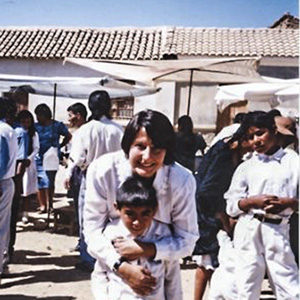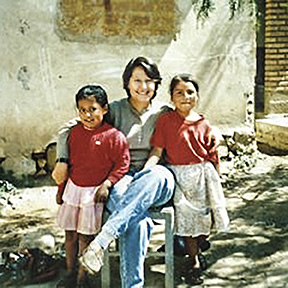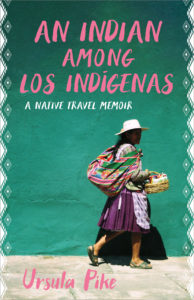Review — AN INDIAN AMONG LOS INDIGENAS by Ursula Pike (Bolivia)
An Indian Among los Indigenas: A Native Travel Memoir
by Ursula Pike (Bolivia 1994–96)
Heyday Books
240 pages
April 2021
$26.00 (Hardcover)
Reviewed by Rich Wandschneider (Turkey 1965–67)
•
My two-year Peace Corps experience ended with a 20-kilometer minivan trip from our Turkish-Kurdish village to the train station in the city of Diyarbakir, in southeastern Turkey. When my village partner Barb and I got to the platform with our bags and boxes, other minivans showed up with a dozen or more of our village friends. The picture of that leaving and the faces and dress of some of those villagers have been fixed in my mind for 54 years. Ursula Pike’s new Peace Corps memoir, An Indian among los Indigenas, brought 1967 rushing back.
There are many important things about this book, but let me tick off three: one, Ursula is a fine writer, with a fine eye for people and places in Bolivia, and an ear for the sounds of languages, buses, and silence; two, she is deeply reflective of the critical tensions of the cross-cultural experience and the mission to serve; and three, Ursula is indigenous herself, an enrolled member of the Karuk Tribe of Northern California who grew up an “urban Indian,” largely, it seems, in Portland Oregon. This last fact, referred to frequently with stories of visits to tribal relatives still living and speaking Karuk lives, and pan-Indian student organizations and urban powwows, is what makes her descriptions of cross-cultural experiences and wrestling with Western notions of “development” and the Peace Corps mission compelling and new. We have not heard much from Indian, Asian, and Black American Volunteers; hopefully this book will throw open the doors.
“In Bolivia,” she writes, “the Andes Mountains broke into two separate ranges and continued bumping along South America into Chile and Argentina . . .. Roads were built around the treeless steep mountains because there was no going over them. In Potosi, the high altitude bone-chilling city whose silver deposits inspired the hot greed of Spaniards . . ..”
How many of us have been struck by the physical beauties and historical clashes that had shaped the countries we found ourselves in? How many of us thought, like Ursula, about the difference between tourists and travelers: “Tourists ordered frozen blue drinks from the hotel bar. Travelers, by contrast, rode buses without shocks for fifty cents while suppressing their explosive diarrhea.”
How many of us thought about our roles as Westerners and our ideas of “development” — and wondered if we were doing the right thing, or wondered if we were promoting a Western agenda that benefited our own country more than it did the people we came to serve? Or worried that we were choosing sides in internal disputes over “progress”? In the end, did we think enough about gifts and givers and the notion of “charity”?
Ursula Pike thinks about all of these things, with the added sensibility of someone who grew up with a single Indian mom who had made her own hard-scrabble way to education and Forest Service and Bureau of Indian Affairs jobs where white men were in charge. She knows what it is to be brown and poor in America, to silently count color and gender in a new room, as she does on the first day of Peace Corps training. She remembers the tiered systems of race, wealth, and education in America, of going to school at an unnamed state college, dreaming of the Peace Corps, waiting and wondering, being told she was not qualified, and finally getting in because she was an American Indian. A Peace Corps recruiter told her that!
 Ursula knows things that most white middle-class American Peace Corps Volunteers don’t know. She’s not surprised that indigenous Bolivians live in cities and wear jeans and T-shirts; Indians in America do too. But she also realizes that she is Indian but not Bolivian, rich and privileged by most Bolivian standards while still poor and a minority in her own country, in the land she will return to.
Ursula knows things that most white middle-class American Peace Corps Volunteers don’t know. She’s not surprised that indigenous Bolivians live in cities and wear jeans and T-shirts; Indians in America do too. But she also realizes that she is Indian but not Bolivian, rich and privileged by most Bolivian standards while still poor and a minority in her own country, in the land she will return to.
There are some nice descriptions of “successful” Volunteers who mount large and dramatic projects — Daniel, who helps villagers dig wells and build a school with a basketball court. We hear about some of her own work, but it is primarily about people and relationships, not about monuments and successful programs. And always there is the questioning — about colonialism and development, missionaries and charity, indigenous and modern. She takes notice of and pride in her hosts’ maintaining Quechua and other native languages, and she empathizes with their struggles with traditional and modern, education and survival.
This book is also brutally honest about Volunteers and sex, Volunteers and alcohol and drugs. Cheap cocaine, male Volunteers’ competition for Bolivian women’s sexual favors, and the difficult gender roles and aspirations of Bolivians themselves become very personal for Ursula Pike. There are times in the book when I wanted to read on but feared doing so.
This first book is brief, only 230 pages, but it is an important book. I was pleased in the introduction to see that her “dog-eared copy” of Moritz Thomsen’s Living Poor is one of a few travel books she clung to as she wrote her own. I remember reading parts of that book in the Peace Corps Volunteer magazine when I was in my village, remember Moritz calculating how many minutes an Ecuadorian clearing land could work on one banana. Living Poor has always been my favorite Peace Corps book, and my touchstone book on poverty and the human condition. An Indian among los Indigenes will go on the shelf beside it. And I will wait for more.
That’s one way to wrap up this review. Here’s another that I am sure will ring like a bell for many in Peace Corps land:

“The girls hugged me and asked me why I had to leave. Despite whatever I did or didn’t do, they loved me and wanted me to stay. I had never imagined it would be this difficult to leave.”
•
Rich Wandschneider (Turkey 1965-67) went to Oregon 50 years ago, after five years as a Peace Corps Volunteer (rural CD) and staff member. His first work was for the Extension Service as a “community development” worker. Launching a bookstore in 1976 led him to meet Alvin Josephy. Josephy had written the big book on the Nez Perce, and was a leading historian of and advocate for American Indians.

Extremely touching and sensitive work, raising core questions about what Peace Corps is in actuality, behind the official paper veil of what is commonly called “development.”
A beautifully written review of what looks to be a very important book. I look forward to reading it.
An excellent and timely review of the indigenous groups in Bolivia by a RPCV who is a member of the Karuk Tribe and the reviewer who is involved with a library focused on American Indian group–a better appreciation and understanding of these group’s values is important and one of the reasons I recently wrote, “Victor Montejo’s Dream for a Secure Maya Community” in Revue Magazine. I also appreciated the reference to the “dog eared” pages of Moritz Thomsen’s “Living Poor” the author of this book, like so many other RPCV writer’s appreciated. This should make for an insightful travel book.
This review is so compelling, obviously written by a talented, experienced writer about a unique and beautiful Peace Corps Volunteer and her American and Bolivian worlds.
Congratulations to both writer and reviewer on the inspiring work they do. I’m grateful for the introduction. And will certainly buy this book and look up Rich’s publications.
Leita Kaldi Davis
*Senegal 1993-96)
Recipient Lillian Carter Award 2017
Another Heyday triumph! Now I cannot wait to read my copy! Cheers for all!
Beatrice
I was excited to learn about this book, and invited Ms. Pike to give a presentation and book-reading at the University of Wisconsin-Madison. Not only did I enjoy the presentation she gave with her husband (also a Bolivia RPCV), but I was fully absorbed by her writing. I read most of it on a 3-4 hour sunny Saturday from my front porch. I was drawn in to her beautiful writing, and struck by the brutal honesty she brought to her own life, as well as her Peace Corps experience. I hope she will come to Madison someday to give an in-person reading and presentation, and have committed to helping her find a venue at our local bookseller, A Room of One’s Own.
For anyone interested, Ms. Pike and her husband (also RPCV Bolivia, but 1995-1997) presented a virtual webinar at the University of Wisconsin – Madison. As the Campus Recruiter, I invited them to help us celebrate Earth Day. You may view the video on YouTube: https://www.youtube.com/watch?v=4bLqoRBnGas